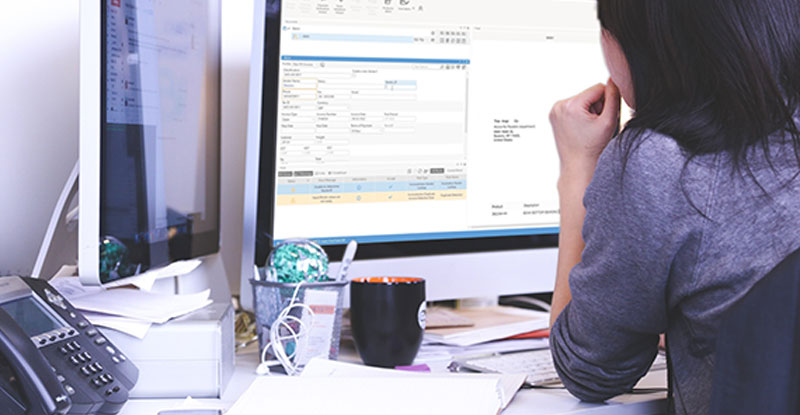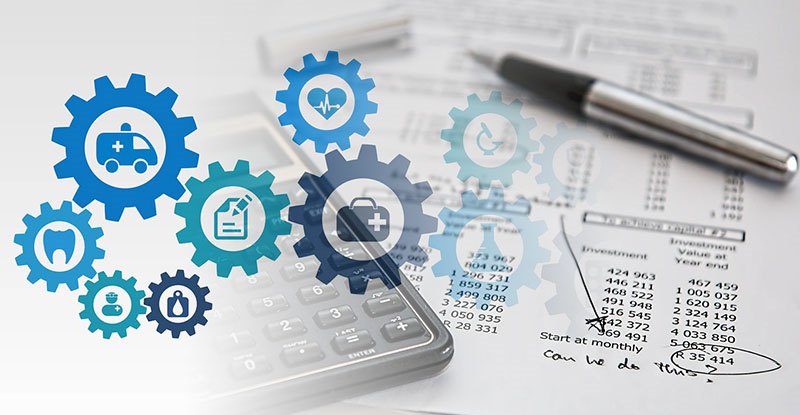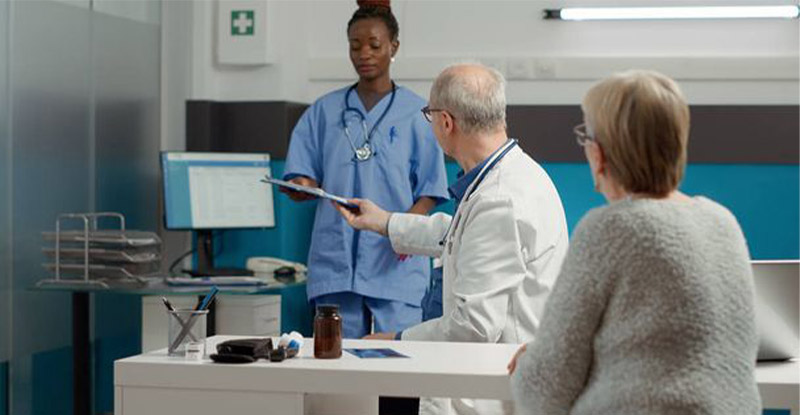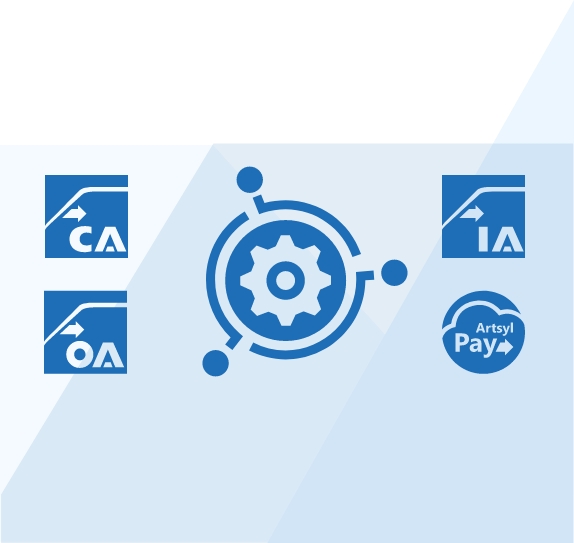Claims processing is an essential part of any healthcare organization. However, the process can be time-consuming and prone to errors, and delays in claims processing can lead to dissatisfied patients.
Luckily, with the latest technological advancements, healthcare providers can now leverage OCR data capture and automation to speed up claims processing and reduce errors. In this blog post, we’ll explore the benefits of using CMS 1500 OCR data capture and automation in healthcare processing.

Tired of tedious paperwork and manual data entry?
Let ClaimAction revolutionize your healthcare practice! Automate CMS 1500 forms effortlessly, streamline your billing process and get paid faster than ever. Take the leap towards efficiency today!
But let’s begin with the basics.
What is CMS 1500?
CMS 1500, also known as the HCFA 1500, is a standard healthcare claim form used in the United States for submitting medical bills and insurance claims. CMS stands for the Centers for Medicare & Medicaid Services, which is a federal agency within the U.S. Department of Health and Human Services.
The CMS 1500 form is widely used by healthcare providers, such as doctors, hospitals, clinics, and other medical professionals, to bill for services provided to patients. It is the standard form used for both Medicare and Medicaid claims, as well as for private health insurance claims.
CMS 1500 form contains various fields where providers must enter information related to the patient, the services provided, and the associated charges. It includes details such as patient demographics, diagnosis codes, procedure codes, dates of service, and the provider’s information. Additionally, CMS 1500 form has sections indicating whether the services were rendered due to an injury, illness, or as part of ongoing treatment.
By completing the CMS 1500 form accurately and submitting it to the appropriate payer (e.g., an insurance company or government program), healthcare providers seek reimbursement for the services rendered to patients. The form helps facilitate the processing of claims and ensures a standardized approach to medical billing and insurance claims in the United States.
Don’t let CMS 1500 forms slow you down! Embrace the cutting-edge OCR technology of ClaimAction to automate your claims processing. Say hello to error-free data, lightning-fast submissions, and a healthier bottom line. It’s time to experience the future of healthcare automation!
Book a demo now
Challenges of Processing CMS 1500 Claims
The CMS 1500 claim form is an integral part of healthcare claims processing. It is used by healthcare professionals to bill for services and supplies rendered to patients. However, processing these claims can be a difficult task.
There are several challenges that arise during processing CMS forms, from ensuring correct data entry to preventing errors and getting them approved. Let’s explore some of the typical challenges of processing CMS 1500 claims and examine ways to overcome them.
CMS 1500 Form is Complex
The CMS 1500 claim form is ten pages long and consists of several different sections, each with its own set of rules and regulations. This can make the form overwhelming and confusing for those who are not familiar with it.
Many healthcare professionals struggle to correctly fill out the form, leaving room for errors and claim denials. It is essential to ensure that the form is filled out accurately to prevent payment delays or reduced payments.
Intelligent Process Automation Solution
Related Videos
Filling Out CMS 1500 Form is Time-Consuming
Processing CMS 1500 claims is a time-consuming process that involves a considerable amount of paperwork. It is important to dedicate ample time to the process to ensure that the forms are completed accurately and in a timely fashion. A lack of time could result in inconsistencies and errors on the form that can lead to a denial or delay in payment.
Avoiding Errors is Essential for the Payment Processing
Even the most minor error on a claim form can result in a claim denial, which can lead to a lengthy appeals process. Minimizing errors on a claim form is critical in ensuring timely reimbursement. Healthcare providers must ensure that data is entered accurately, and avoid confusing billing codes that could lead to inappropriate billing. There are several tools, such as claims scrubbers, that can help check for errors before submission.
Preventing Denials Through Error-Free Submissions
If a claim is denied, it can lead to a long and complicated appeals process, taking up valuable time and resources. Preventing denials is crucial in ensuring that the payment process is as streamlined as possible. Proper coding, detailed documentation, and accurate claim submission are all important to avoid denials.
Keeping Up with Regulatory Changes
Healthcare is an ever-changing field, and it can be challenging to keep up with regulatory changes. The CMS 1500 claim forms undergo regular updates, and healthcare providers must stay updated on these changes. Keeping up with these changes ensures that the claims are submitted appropriately and that the reimbursement process is seamless.
As you can see, processing CMS 1500 claims can be a challenging task, given the complexity of the form and the number of rules and regulations governing submission. By accurately filling out the form, avoiding errors, preventing claim denials, and staying up to date with regulatory changes, processing claims can be a smooth and efficient process.
As a healthcare provider, staying informed and educated on these challenges is crucial in ensuring accurate and timely payment for services.
Don’t let CMS 1500 forms be a roadblock to your practice’s profitability. Discover the game-changing capabilities of ClaimAction — harnessing the power of AI, OCR, and intelligent automation. Boost your productivity, reduce claim rejections, and watch your revenues soar to new heights!
Book a demo now
How OCR Data Capture is Used in Healthcare
The field of healthcare is constantly evolving, and with advances in technology, there are new ways to improve patient care and streamline processes. One such technology is OCR data capture, which stands for optical character recognition.
OCR technology is being increasingly used in healthcare to quickly and accurately capture data from medical records, prescriptions, and insurance claims. OCR data capture works by using software to recognize printed or handwritten text and convert it into machine-encoded text.
Thanks to it flexibility, OCR technology has the potential to reduce errors in manual data entry and increase the speed of administrative tasks, allowing healthcare providers to focus more on patient care. By utilizing OCR data capture, the healthcare industry is taking a step towards a more efficient future. Here are the benefits of using OCR software in processing CMS 1500 forms.
Improved CMS Form Accuracy with OCR Data Capture
OCR data capture eliminates manual data entry, which can often lead to errors. By using intelligent character recognition tools, healthcare providers can ensure the data captured is accurate, improving the overall quality of the claims workflow. This level of accuracy can prevent claims from being rejected and result in fewer appeals and inquiries, saving your staff time and energy.
Faster CMS 1500 Form Processing with OCR technology
Automation using OCR data capture can significantly reduce the time it takes to process a claim. Manual methods of processing incurred claims can lead to errors and inefficiencies, which can increase claim rejection times and ultimately delay reimbursement.
In contrast, automation with specialized electronic healthcare form automation software can process claims much faster than manual entry. It scans a claim for accuracy in seconds, ultimately reducing the time spent processing claims and increasing revenue streams for the healthcare provider.
Lower Costs of CMS Form Processing
Electronic claims reduce the amount of manual labor needed to analyze claims, resulting in a reduction in administrative costs. Automating the initial claims workflow reduces the number of employees required to process claims and reduces the likelihood of a billing mistake. The fewer errors there are, the faster and more efficient the reimbursement process is. Efficiency in the claims process inevitably leads to better financial performance for the healthcare provider.
Improved Patient Satisfaction Thanks to OCR Technology
Delays in the processing of claims can have a negative impact on the overall patient experience. Automation reduces the likelihood of rejections, which means patients get reimbursed faster. It also allows for minor disputes to be resolved quickly without lower-level input, ultimately streamlining the claims process. This results in better relationships with patients and overall patient satisfaction.
User-friendly CMS 1500 Form Processing
Another advantage of using OCR data capture and automation is that it’s user-friendly. Healthcare professionals often find manual claims processing time-consuming and stressful. Automating the process is less complicated and less tedious than manual methods.
Intelligent form automation also helps reduce the number of claims that need manual re-work or research thanks to its efficient resolution methods. This means more claim settlements are processed correctly and more quickly, ultimately leading to increased revenue for the healthcare provider.
No more data entry nightmares! ClaimAction’s advanced OCR technology works tirelessly to automate your CMS 1500 forms, ensuring accurate data capture and seamless submissions. Experience the joy of hands-free processing and reclaim precious time for what truly matters — patient care!
Book a demo now
How ClaimAction and OCR Technology Automate CMS 1500
Artsyl ClaimAction is an advanced intelligent automation platform designed to streamline and automate various processes within the healthcare industry, including the processing of CMS 1500 forms. By combining OCR (Optical Character Recognition) technology with intelligent data capture capabilities, Artsyl ClaimAction can significantly enhance the efficiency and accuracy of handling CMS 1500 forms.
Here’s how Artsyl ClaimAction and OCR technology automate CMS 1500:
Document Capture and Recognition
The platform utilizes OCR technology to scan and capture data from the CMS 1500 forms. OCR technology converts scanned images into machine-readable text, making it easier for the system to process and interpret the information.
Data Extraction
After OCR processing, Artsyl ClaimAction’s intelligent data capture capabilities come into play. The platform identifies relevant fields on the CMS 1500 form, such as patient information, procedure codes, diagnosis codes, dates of service, and billing amounts.
Data Validation and Verification
The system cross-checks the extracted data with pre-defined validation rules and business logic to ensure accuracy and completeness. Any potential errors or inconsistencies are flagged for review, reducing the chances of manual data entry mistakes.
Automated Data Entry into EMR/Billing Systems
Once the data extraction and validation process is complete, Artsyl ClaimAction automatically populates the relevant fields in Electronic Medical Record (EMR) systems or billing software. This eliminates the need for manual data entry, reducing human errors and saving valuable time for healthcare providers.
Claim Submission
After data entry, Artsyl ClaimAction can generate standardized electronic CMS 1500 claim forms that can be submitted directly to insurance companies or government programs. This process expedites claim processing and accelerates reimbursement cycles.
Exception Handling and Reporting
In cases where the system encounters complex or ambiguous data, Artsyl ClaimAction can flag these as exceptions for manual review. The platform also generates detailed reports on the processing results, giving healthcare providers valuable insights into claim statuses and potential issues.
Overall, Artsyl ClaimAction, powered by OCR technology, significantly improves the efficiency and accuracy of handling CMS 1500 forms. By automating the data capture and submission processes, healthcare providers can streamline their billing operations, reduce administrative costs, and expedite claim reimbursement, ultimately improving patient care and financial outcomes.
Worried about compliance and accuracy? Let ClaimAction ease your mind! Our proven platform excels in processing CMS 1500 forms with the utmost precision and adherence to regulations. Focus on patient care while we handle the complexities of billing — your success is our priority!
Book a demo now
Final Thoughts: Making CMS Claims Workflows Efficient with OCR
Automation of CMS forms and the healthcare claims process is beneficial to the healthcare provider and patient, resulting in a more effective and efficient workflow. The use of OCR data capture and automation leads to reduced processing time, significant cost savings, and improved accuracy.
When healthcare providers automate their claims workflow, they are improving the overall patient experience and increasing revenue streams. In summary, it’s time to adopt CMS 1500 OCR data capture and automation in your healthcare processing today!


 Automate claims, Reimburse quickly
Automate claims, Reimburse quickly Intelligent Automation for Handling Claims
Intelligent Automation for Handling Claims How to Use OCR Software for PDFs and Other File Formats
How to Use OCR Software for PDFs and Other File Formats Lean Medical Claims Processing
Lean Medical Claims Processing OCR Automation in the Digital Age
OCR Automation in the Digital Age Improving Medical Claims Processing Through Technology
Improving Medical Claims Processing Through Technology